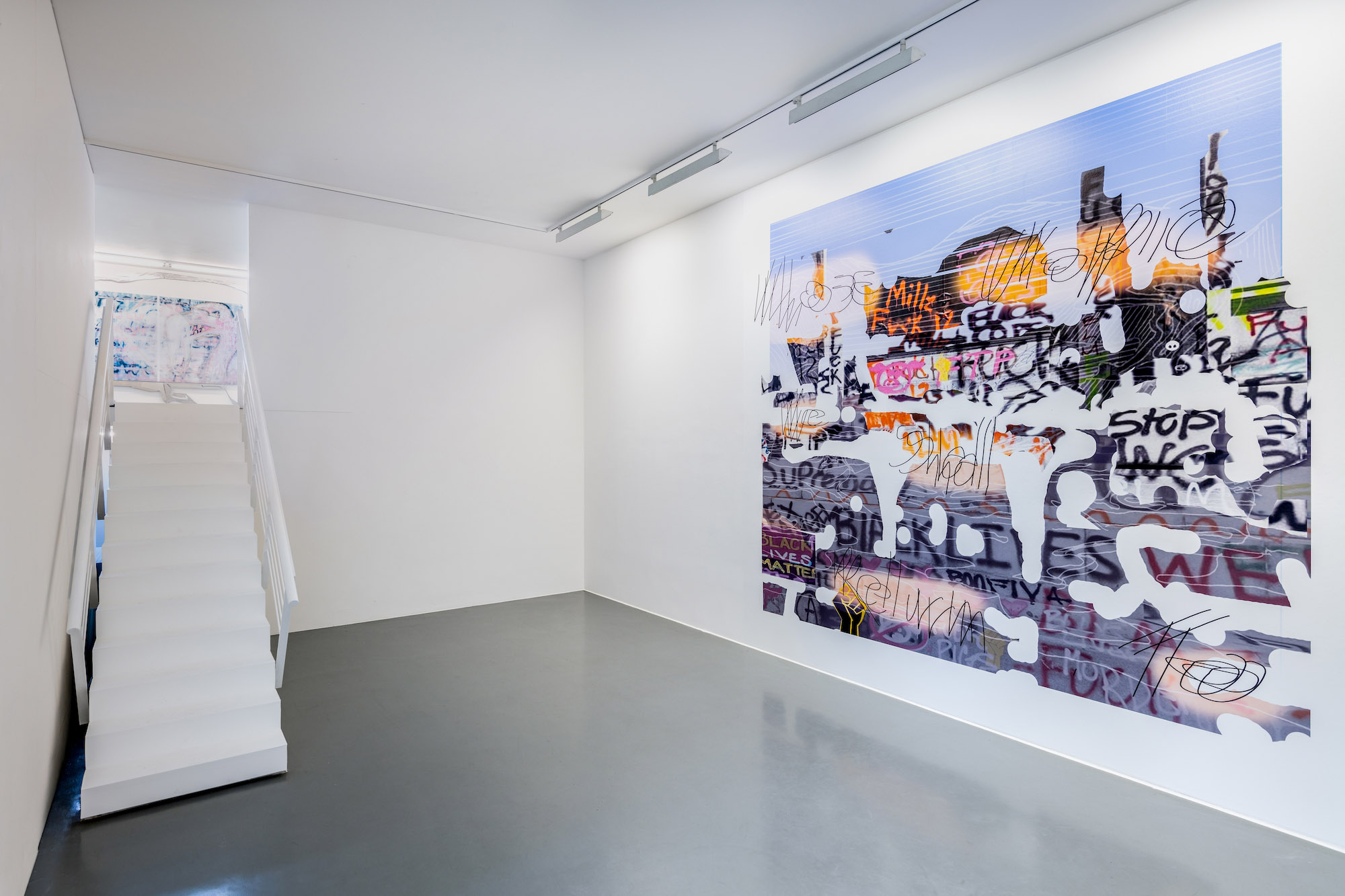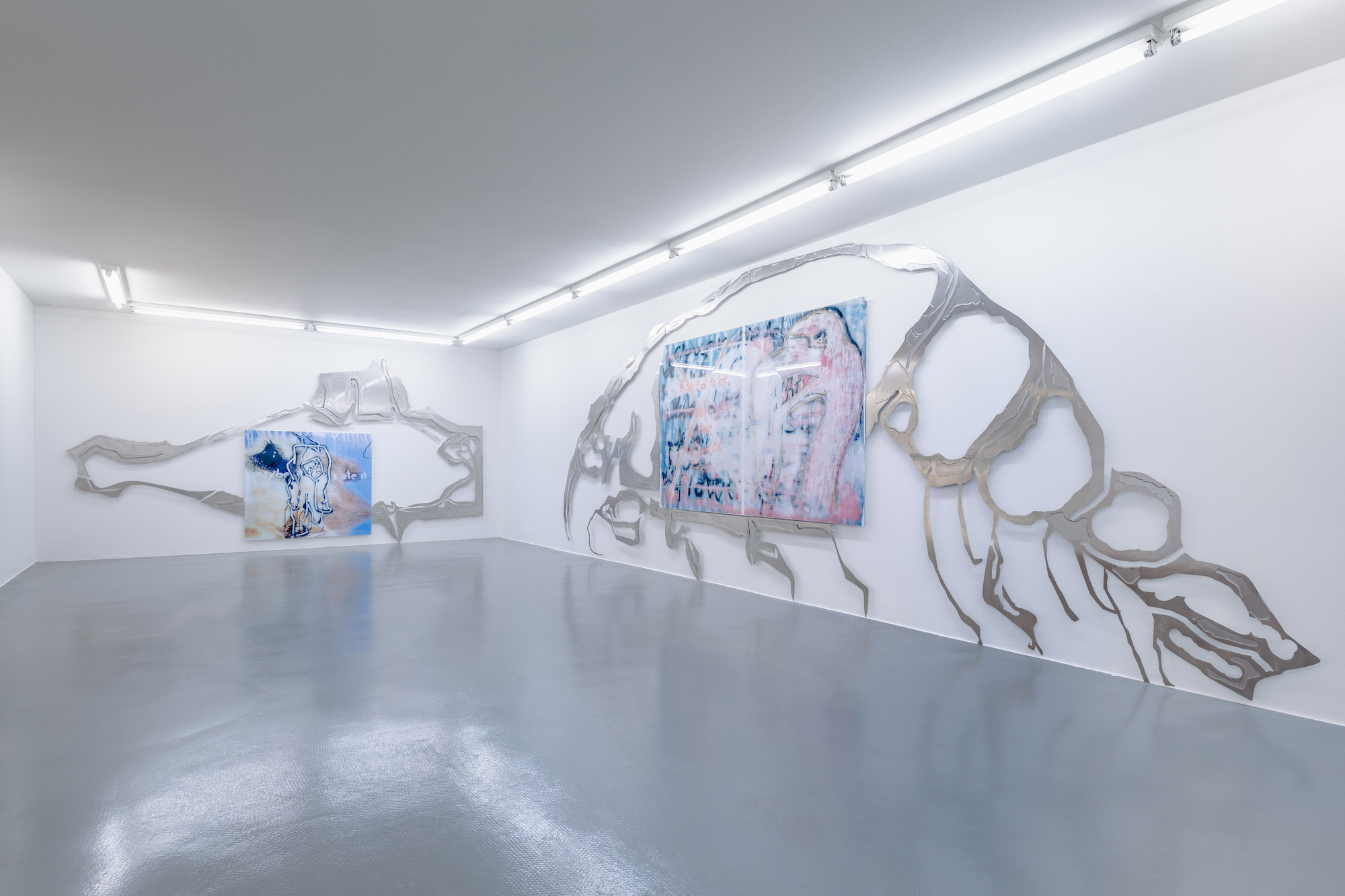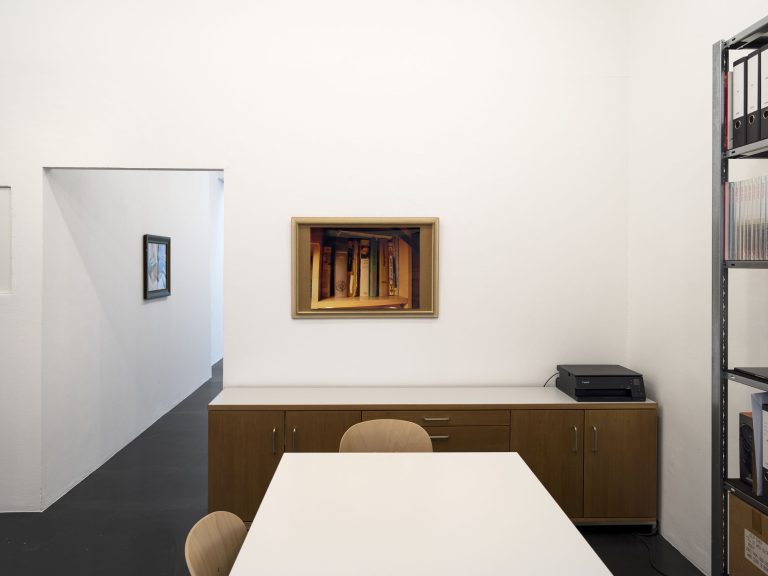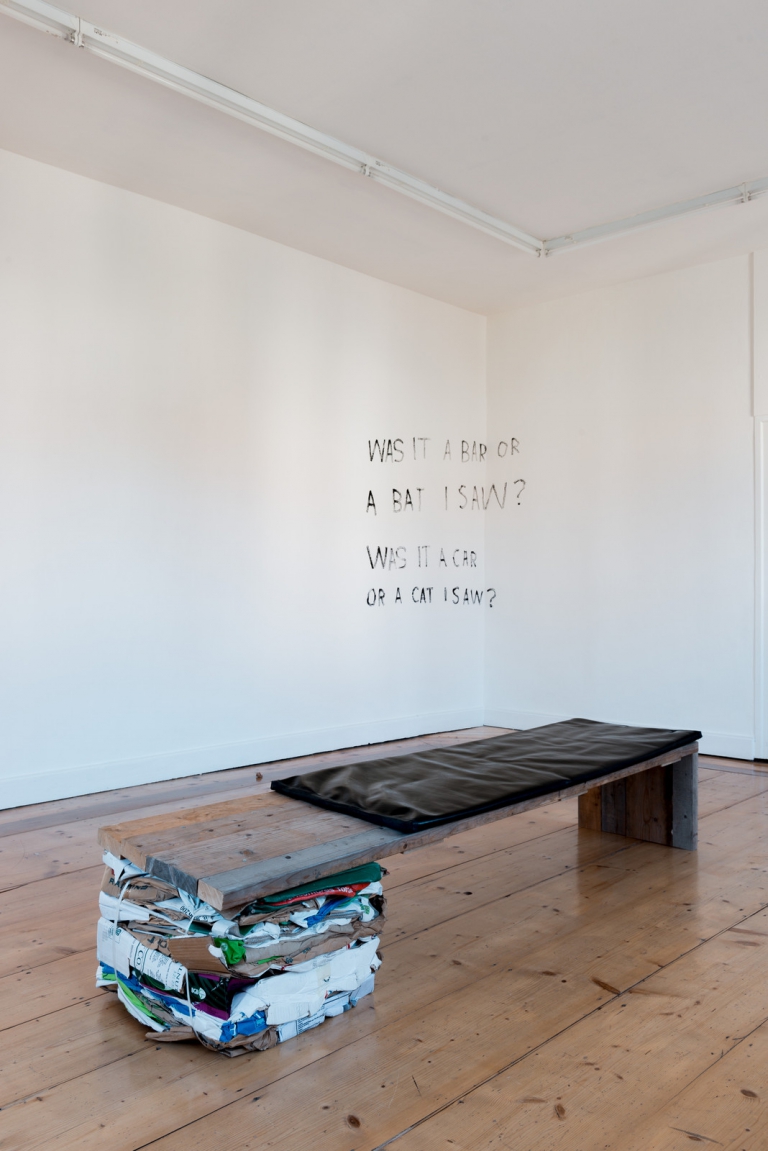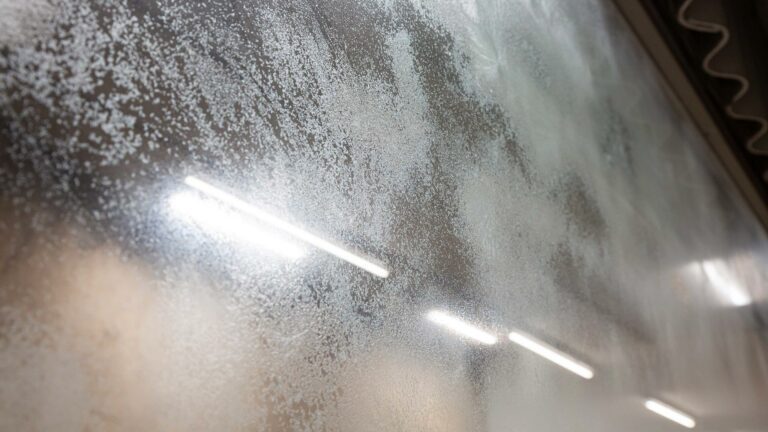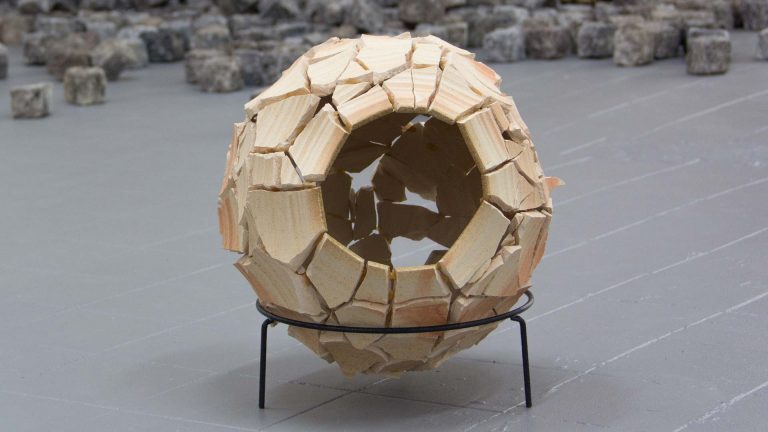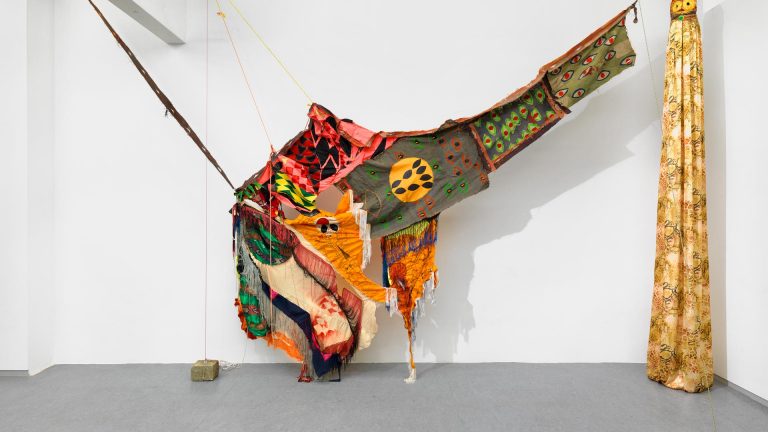Artist: Flaka Haliti
Exhibition title: maybe i ate it
Curated by: Hannah Eckstein
Venue: Kunstverein Friedrichshafen, Friedrichshafen, Germany
Date: December 11, 2021 – February 13, 2022
Photography: Kilian Blees / all images copyright and courtesy of the artist and Deborah Schamoni
Based on subjective experiences, Flaka Haliti keeps on looking at our fragmented, contradictory present. At the centre of her artistic practice is the individual and the question, how identity is constructed in a global fluid world. Her poetic and hybrid works which are often infused with irony, draw from the comedy of tragedy, and recount of living between different cultures, of exclusion, adaptation and of being different.
To bring her artistic concepts into a visual form, she uses various medias such as photography, collage, drawing and graphical as well as sculptural elements. Her works often have a decidedly spatial reference and culminate in extensive installations which allow the viewers to immerse themselves into new worlds which open up different perspectives to them.
In the exhibition maybe i ate it Flaka Haliti follows an ‘ethics of proximity’ and spins references to the contradictions of our ambivalent current time and to socio-political realities such as migration and racism, by using the three most invasive animal species of the Lake Constance. Hybrid works between image and sculpture depict the silhouettes of the muscle zebra, the three-spined stickleback and the killer shrimp. These three species presumably ‘immigrated’ to the Lake with the help of cargo ships from the Black Sea region and thus are, as the work “Things keep falling to earth” suggests, phenomena which occur in accordance with the laws of nature and can no longer be reversed.
Considering the paradoxes created by the attempts to solve our environmental problems, Flaka Haliti recontextualizes the ecosystem of the Lake Constance and associates its natural laws with our human cohabitation. This approach is underpinned by the notion that a sense of a particular place can feed equal support to both, conservative and progressive politics within larger contexts such as the nation or transnational realms.
Materially and metaphorically, Flaka Haliti creates a moment of disidentification through her erratic aesthetic choices. Detached from prefabricated thought patterns and structures, she insists that diverse should be considered for everyone only as a relation, not as an absolute power or a unique possession over right and representation.
Three floor-to-ceiling wall works with letterings such as “BLACK LIVES MATTER” or “Supremacy” and the impression of oversized, repeatedly pasted-over billboards are set pieces of our lived reality. Again and again, the viewers are directly confronted by statements and questions such as “I’m imitating you, but you are changing all the time” or “Whose Utopia we Shall Return to?” and become involved in an existential dialogue that reveals the contradictions, dead ends – and maybe even the way out – of our ambivalent human existence.
Flaka Haliti (born 1982 in Pristina, Kosovo) studied graphic design at the Faculty of Arts at the University of Pristina and art at the Städelschule, Frankfurt. She was nominated for the Preis der Nationalgalerie, Hamburger Bahnhof, in 2019, was a scholarship holder at the Villa Romana in Florence and is the winner of the Ars Viva Prize 2015. In 2015 she furthermore represented the Republic of Kosova at the 56th Venice Biennale. Her works were shown in solo and group exhibitions at the Museum Moderner Kunst in Vienna, the MIZA Gallery in Tirana, the Kunsthalle Hamburg, the Ludwig Museum in Budapest, the Salzburger Kunstverein and the Kunsthalle Wien among others.
Flaka Haliti, I’m imitating you, but you are changing all the time, 2021 Wallpaper, 440 x 440 cm; Things keep falling to earth, 2021 Wallpaper, 440 x 440 cm
Flaka Haliti, Things keep falling to earth, 2021; Whose Utopia we shall return to, 2021 Wallpaper, 440 x 440 cm
Flaka Haliti, Whose Utopia we shall return to, 2021; wished to be camouflaged in some sunflower field, 2021 Digital collage, drawing, glass, metall, resin, 2 parts: 120 x 200 cm; 558 x 199 cm
Flaka Haliti, wished to be camouflaged in some sunflower field, 2021 Digital collage, drawing, glass, metall, resin, 2 parts: 120 x 200 cm; 558 x 199 cm
Flaka Haliti, wished to be camouflaged in some sunflower field, 2021 Digital collage, drawing, glass, metall, resin, 2 parts: 120 x 200 cm; 558 x 199 cm; the place i thought i reached seems to have moved again, 2021 Digital collage, drawing, glass, metall, resin, 2 parts: 96 x 105 cm; 218 x 165 cm
Flaka Haliti, wished to be camouflaged in some sunflower field, 2021 Digital collage, drawing, glass, metall, resin, 2 parts: 120 x 200 cm; 558 x 199 cm; maybe i ate it, 2021, Digital collage, drawing, glass, metall, resin, 2 parts: 101 x 106 cm; 341 x 189 cm
Flaka Haliti, wished to be camouflaged in some sunflower field, 2021 Digital collage, drawing, glass, metall, resin, 2 parts: 120 x 200 cm; 558 x 199 cm
Flaka Haliti, wished to be camouflaged in some sunflower field, 2021 Digital collage, drawing, glass, metall, resin, 2 parts: 120 x 200 cm; 558 x 199 cm
Flaka Haliti, maybe i ate it, 2021, Digital collage, drawing, glass, metall, resin, 2 parts: 101 x 106 cm; 341 x 189 cm
Flaka Haliti, maybe i ate it, 2021, Digital collage, drawing, glass, metall, resin, 2 parts: 101 x 106 cm; 341 x 189 cm
Flaka Haliti, the place i thought i reached seems to have moved again, 2021 Digital collage, drawing, glass, metall, resin, 2 parts: 96 x 105 cm; 218 x 165 cm
Flaka Haliti, the place i thought i reached seems to have moved again, 2021 Digital collage, drawing, glass, metall, resin, 2 parts: 96 x 105 cm; 218 x 165 cm
Flaka Haliti, the place i thought i reached seems to have moved again, 2021 Digital collage, drawing, glass, metall, resin, 2 parts: 96 x 105 cm; 218 x 165 cm




